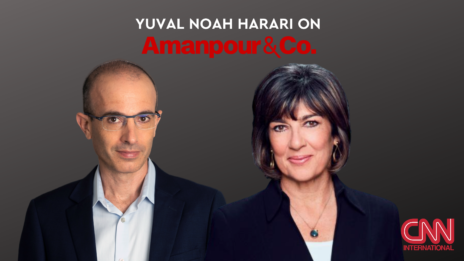
In market economics, we maintain that the customer is always right.
Yuval noah harari interview free#
In politics, we believe that authority depends on the free choices of ordinary voters. From infancy we are bombarded with a barrage of humanist slogans counselling us: “Listen to yourself, be true to yourself, trust yourself, follow your heart, do what feels good.” For the past few centuries humanism has seen the human heart as the supreme source of authority not merely in politics but in every other field of activity. Gove is not alone in listening to his heart in critical moments. When Michael Gove announced his shortlived candidacy to become Britain’s prime minister in the wake of June’s Brexit vote, he explained: “In every step in my political life I have asked myself one question, ‘What is the right thing to do? What does your heart tell you?’” That’s why, according to Gove, he had fought so hard for Brexit, and that’s why he felt compelled to backstab his erstwhile ally Boris Johnson and bid for the alpha-dog position himself - because his heart told him to do it. Once that happens, humans will lose their authority, and humanist practices such as democratic elections will become as obsolete as rain dances and flint knives. If you upload something - share it.”ĭataists further believe that given enough biometric data and computing power, this all-encompassing system could understand humans much better than we understand ourselves. The new motto says: “If you experience something - record it. As the global data-processing system becomes all-knowing and all-powerful, so connecting to the system becomes the source of all meaning. Just as free-market capitalists believe in the invisible hand of the market, so Dataists believe in the invisible hand of the dataflow. All you need to do is answer your emails faster. This relentless dataflow sparks new inventions and disruptions that nobody plans, controls or comprehends.īut no one needs to understand. I don’t have time to find out, because I am too busy answering emails. I don’t really know where I fit into the great scheme of things, and how my bits of data connect with the bits produced by billions of other humans and computers. Every day I absorb countless data bits through emails, phone calls and articles process the data and transmit back new bits through more emails, phone calls and articles. We are already becoming tiny chips inside a giant system that nobody really understands. In its extreme form, proponents of the Dataist worldview perceive the entire universe as a flow of data, see organisms as little more than biochemical algorithms and believe that humanity’s cosmic vocation is to create an all-encompassing data-processing system - and then merge into it. This novel creed may be called “Dataism”. Just as divine authority was legitimised by religious mythologies, and human authority was legitimised by humanist ideologies, so high-tech gurus and Silicon Valley prophets are creating a new universal narrative that legitimises the authority of algorithms and Big Data. I need only consult myself with regard to what I wish to do what I feel to be good is good, what I feel to be bad is bad.” Humanist thinkers such as Rousseau convinced us that our own feelings and desires were the ultimate source of meaning, and that our free will was, therefore, the highest authority of all. When looking for the rules of conduct in life, Rousseau found them “in the depths of my heart, traced by nature in characters which nothing can efface.



Jean-Jacques Rousseau summed up this revolution in Emile, his 1762 treatise on education.

Then, during the modern era, humanism gradually shifted authority from deities to people. For thousands of years humans believed that authority came from the gods.


 0 kommentar(er)
0 kommentar(er)
